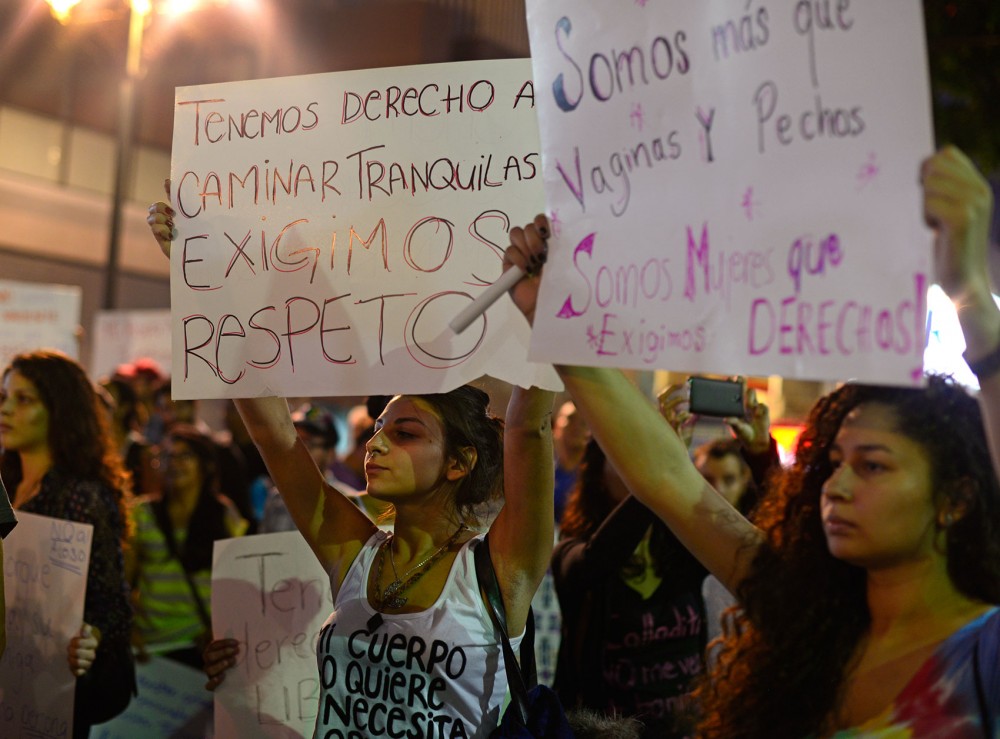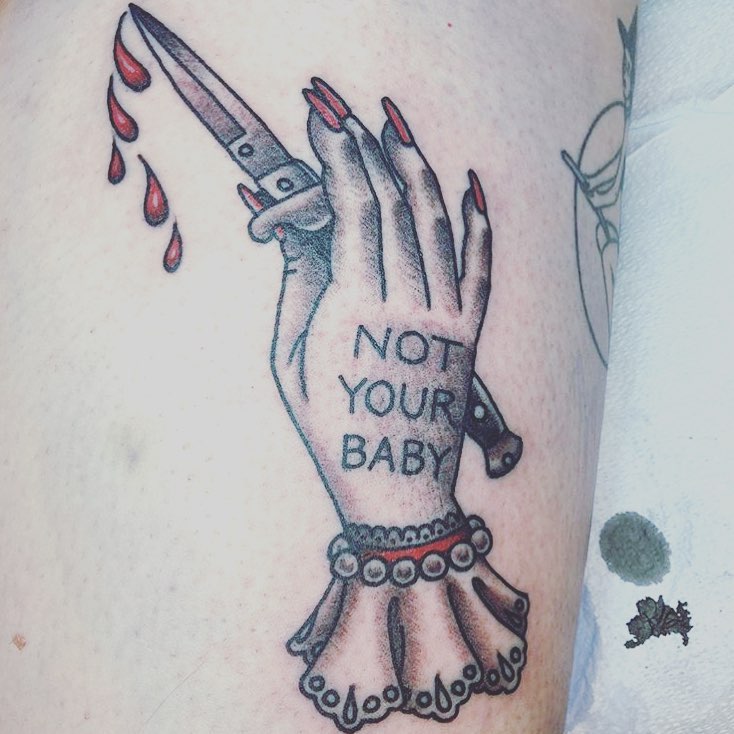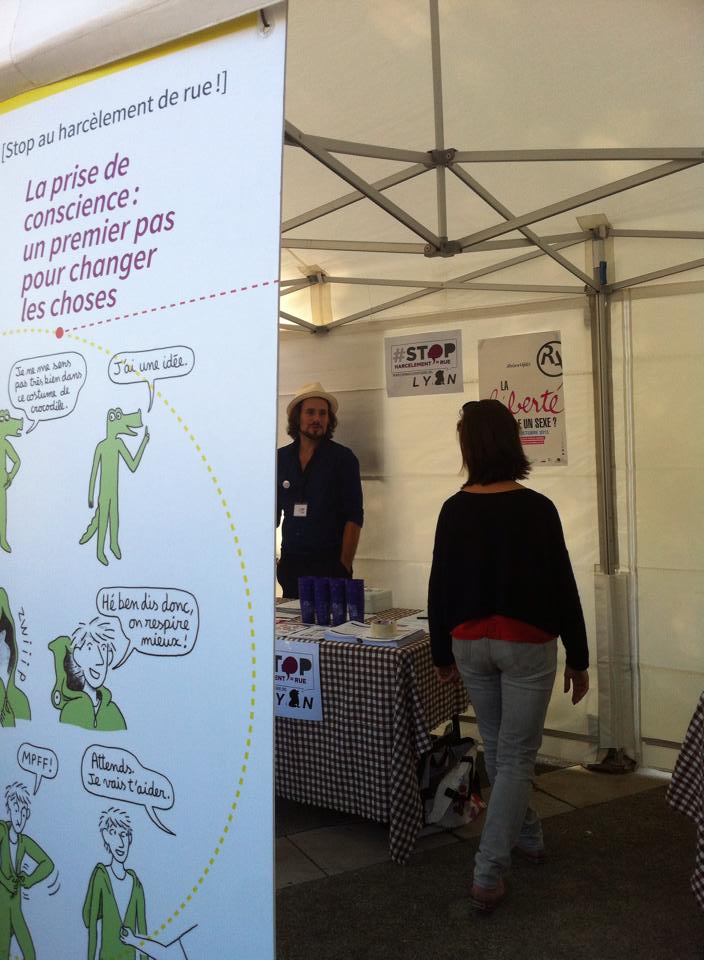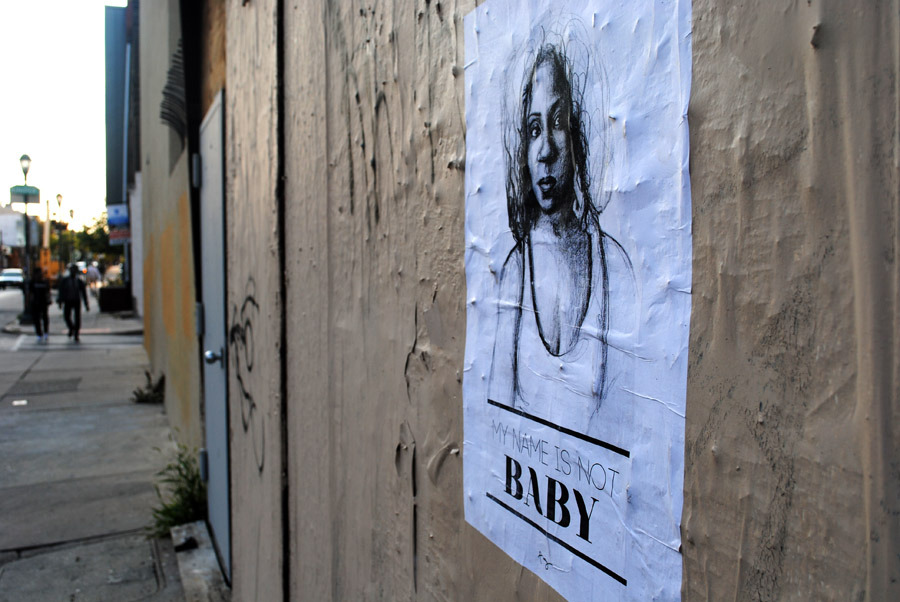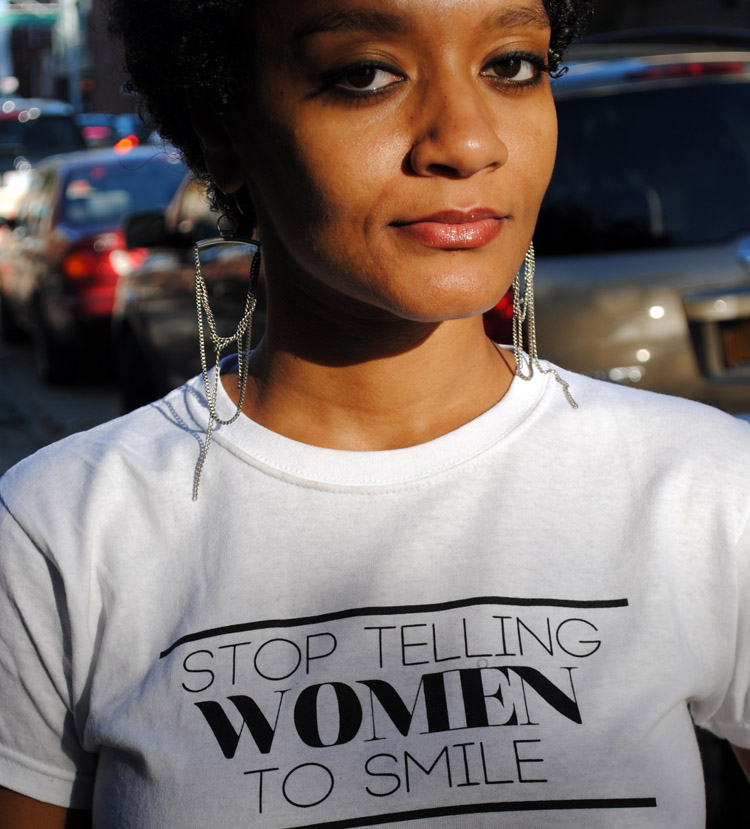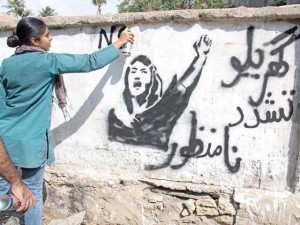
Pakistan Tribune, “NSF seeks to empower women via ‘Draw for Feminism’ campaign”
“Around 20 young men and women took to street art and painted slogans and images against domestic violence, street harassment, identity crisis, stereotypes and rape. Employing stencils and paints, the group went about raising their voice through graffiti in Gulshan-e-Iqbal, North Nazimabad, Saddar, Tower, II Chundrigarh Road, Karachi Press Club and Numaish. Talking about what drove them to initiate the campaign, NSF Karachi organiser Muzammal Afzal said until women of our society are not freed, the society cannot exist as a free entity.”
 Mic, “Samantha Bee Starts #SmileForJoe Twitter Campaign Against MSNBC Host Joe Scarborough”
Mic, “Samantha Bee Starts #SmileForJoe Twitter Campaign Against MSNBC Host Joe Scarborough”
“While Democratic frontrunner Hillary Clinton had a successful Tuesday with the five states voting in the primaries, there was one issue with her victory speech, according to male pundits: She didn’t smile enough. MSNBC anchor Joe Scarborough was the headlined instigator, directing in a tweet that the former Secretary of State “smile” after her “big night.”
Samantha Bee — host of the new TBS late night show Full Frontal — didn’t agree with Scarborough’s slight. In response, the comedian has started a #SmileForJoe campaign on Full Frontal’s Twitter, beginning with a photo of herself frowning, coupled with the caption: “Ladies, it’s very important that you #SmileForJoe.””
iSchool Guide, “California Becomes First State To Make Sexual Consent Lessons Mandatory In High Schools Beginning Next Year”
“California Governor Jerry Brown’s office announced Thursday that the state will require all high schools statewide to teach students about sexual consent. Brown’s approval of the measure made California the first U.S. state to take such move..
The new law mandates all school districts that have made health a graduation requirement to lecture students about sexual violence prevention and affirmative consent starting next year. It also urges state education officials to include those topics to their high school health curriculum.”
The Tico Times, “Costa Rica march demands end to street harassment”
“Over 100 people on Tuesday evening marched along San José’s Central Avenue to protest the persistent sexual harassment of women – and sometimes men – in public places, including streets, sidewalks, parks and the workplace.
Dubbed “Las calles también son nuestras” – “The streets are ours, too” – the demonstration was convened by the National Women’s Institute (INAMU) as part of International Women’s Day….
Members of several human rights and LGBT groups joined the protest.
Costa Rican President Luis Guillermo Solís, first lady Mercedes Peñas and the couple’s daughters joined demonstrators, along with Vice President Ana Helena Chacón and Women’s Issues Minister and INAMU President Alejandra Mora.
“I’m here to demand that women can walk and work peacefully in public spaces,” President Solís said. “We cannot tolerate more aggression. Violence is unacceptable.”
MSN, “Bus No. 8 conductor sacked for alleged sexual harassment of female passenger”
“A conductor of the bus was fired yesterday after a female passenger accused him of sexually harassing her during a ride from MRT Ladprao on Saturday night.
The Bangkok Mass Transit Authority (BMTA) instructed the bus operator to fire the conductor, identified only as “Pai,” yesterday following a complaint by a woman who claimed Pai was being a total creep by touching her and then following her when she got off the bus.”
Women 24, “Does Zuma Approve Catcalling?”
“…Speaking to a group of female journalists on Saturday, [South African president Jacob Zuma] said that ‘when men compliment [women] innocently, you say it’s harassment. You will miss out on good men and marriage.'”
There are countless resources available on why street harassment is not flattering, and I encourage you to do some research. For now, let me explain in a nutshell why catcalls and wolf whistles from strangers are not compliments.
Commenting on a woman’s appearance immediately reduces her to an object. To you, she is nothing more than her looks. Saying ‘Hey cutie’ or ‘Looking good, baby!’ or ‘I’d like to bury my face in that ass’ — yeah, don’t do that.
It also implies that women exist for men’s viewing pleasure. She did not ask for your thoughts on her appearance; believing you have the right to give it — or that she should be grateful for your unsolicited opinion — is presumptuous…..”
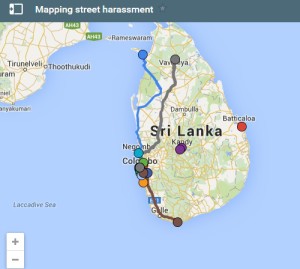 Ground View, “Mapping Street Harassment [in Sri Lanka] This Women’s Day”
Ground View, “Mapping Street Harassment [in Sri Lanka] This Women’s Day”
“March 8 marks International Women’s Day, and this year Groundviews decided to highlight the widespread nature of street harassment, by mapping it. Each marker tells a story – a story of a woman trying to go home, to work, or just about her day – only to be made to feel uncomfortable, or even unsafe. View the map directly here.”
Mic, “A Reporter Was Slut Shamed After a Man Pulled Her Underwear Down on the Street”
“In the CCTV footage, Noel is seen walking down the street [in Mexico] while an unidentified man creeps up behind her. The man lifts her skirt up, pulls down her underwear and runs away, while Noel is left sprawled in the streets.
“If anyone recognizes this imbecile, please identify him,” Noel wrote in her tweet, in Spanish. “Women should be able to walk safely. #FelizDiaDeLaMujer [translation: Happy Women’s Day].”
For the most part, Noel’s tweet garnered an outpouring of support, as well as nearly 4,000 retweets in the span of only a few days. Yet a small number of literal demons felt it was appropriate to blame Noel for the assault, attributing it to, among other things, her blonde hair and the way she was dressed.”
Esquire, “12 Things About Being A Woman That Women Won’t Tell You”
“#6: Fear. We’re scared. We don’t want to mention it, because it’s kind of a bummer, chat-wise, and we’d really like to talk about stuff that makes us happy, like look at our daughters — and we can’t help but think, “Which one of us? And when?” We walk down the street at night with our keys clutched between our fingers, as a weapon. We move in packs — because it’s safer. We talk to each other for hours on the phone — to share knowledge. But we don’t want to go on about it to you, because that would be morbid. We just feel anxious. We’re scared. Given the figures, we can’t sometimes help but feel we’re just… waiting for the bad thing to come. Because that would be a realistic thing to think, and we like to be prepared. Awfully, horribly, fearfully prepared.”
Khaama Press, “Afghan Women to Use Technology to Stop Street Harassment”
“As part of ongoing celebrations of Women’s History Month, USAID’s Promote Women in the Economy (WIE) program recognized three women who developed the best concepts for a mobile device application to help women confront street harassment in Afghanistan.
The applications, developed as part of USAID WIE’s first Code Challenge competition, will allow women to report harassment in real time as it occurs and identify problem areas, or to send a message to friends, family members, or other nearby users to ask for assistance.”
National Post, “In a Canadian first, survivors of sexual violence will get free legal advice in Ontario pilot program”
“Anyone who has experienced a sexual assault in Toronto, Ottawa and Thunder Bay — the host cities for the pilot — will be offered access to four hours of free legal advice.
“It’s not representation in court but to help these women to make an informed decision: what are their options, what are the services offered to them,” Ontario Attorney General Madeleine Meilleur said. “At the end they will make their decision: do I go forward, what do I do?”
While some advocates have called for sexual assault complainants to get equal standing in criminal trials to defendants, that’s a federal matter and one that would challenge centuries of common law. This move is meant to empower and inform these individuals of their legal rights and options without upending the justice system.”
Guardian Series, “‘We have a growing problem of sexual harassment in Walthamstow’ – MP speaks out as activists organise march”
“Stella Creasy MP [in the UK] has spoken out about the fear women have of sexual harassment on the streets of Walthamstow as she invites people to a day of action to celebrate International Women’s Day.
The Walthamstow Labour MP will take part in a march to tackle street harassment and she has also organised a “feminist bootcamp” to develop the leadership skills of women on Saturday (March 5).”
The Irish Times, “Street harassment: Feeling intimidated familiar for women”
“As women speak up more and call out harassment and violence as simply unacceptable, men need to get involved too. Men need to call out unacceptable behaviour by their friends. They need to stand up for women. They need to know that being drunk isn’t an excuse to act like a thug. They need to realise that women live in a world where the violence perpetrated against them is very often gendered, a violence and harassment that emerges from a culture of misogyny and a desire – however subconscious – to keep women in their place and to exert a sort of power over them that reminds them of who rules.
The threat that hangs in the air at night when a woman is walking past a group of men is not made up, it is not fantasy or an unfounded fear. The sense of threat is real because the outcome of that sense is often very real too. It’s not ok, it’s never ok, and we all have a duty to stand up against it and end it.”
al-Monitor, “How a new website is helping Lebanese women avoid sexual harassment”
“Nour confided how she had experienced shame after being touched by a stranger in a service when she was 19. She remembered, “I told no one what happened that day, not even my parents. I was feeling so shameful. Later on, I understood that the shame was not mine to feel, but his. It was not my fault.” Allowing women to express what happened to them anonymously is one of the purposes of HarassTracker as well as applying words to the act of harassment.
“It is empowering to say that happened and that was sexual harassment,” Mir, the website’s designer, told Al-Monitor. “Even if there is a doubt, nuances, you can at least make other people understand. At least we can change things a bit to make people start talking. People don’t go to our website only to denounce a harassment, they visit too. So it’s always positive, even though it’s not going to make the situation evolve right away,” said Mir.”
Raw Story, “SXSW panel: Sexual harassment and bullying in gaming cannot be dismissed just because it’s online”
“Online harassment and sexism is demeaning women and can no longer be brushed aside as an ugly side of social media and the gaming industry if they are to thrive, panelists on Saturday said at the South By Southwest (SXSW) tech meeting in Austin.
The gaming summit at one of the premier events on the global tech calendar had faced threats of violence, prompting organizers in October to initially suspend two panels on the subject. After facing a flood of criticism from online media firms, SXSW organizers reversed course and set up a full day of discussions on the subject.
Bustle, “I Confronted My Street Harassers, And Reclaimed My Power In The Process”
“The fear of experiencing violence at the hands of a man is all too real for women, but the alternative is living my life in fear of what may happen. I don’t know how I’m going to die, but I do know how I don’t want to live.
Street harassment is not inevitable. I have seen the impact responding to someone can have. If, in my mission to reclaim my personhood, I’ve deterred one man from harassing another woman on the street, then I’ve been more successful than I could ever imagine. Our bodies belong to us. We are not public property, and no one has the right to make us feel otherwise.”
The Michigan Daily, “Melissa Scholke: We must share our stories”
“I write this acknowledging that street harassment, or cat-calling, is a societal problem with no easy, immediate solution. My encounters with this issue began around the age of 18 and will most likely continue for many more years to come. For others from different races, religions and communities, their experiences may differ vastly in severity and frequency. Regardless, these experiences need to be recounted and retold as frequently as they occur.
Over break, I read essays by Rebecca Solnit, and one section of her essay, “Pandora’s Box and the Volunteer Police Force,” stood out to me. She writes, “Saying that everything is fine or that it will never get any better are ways of going nowhere or of making it impossible to go anywhere.”
When my friend first suggested I write about street harassment, I thought it was redundant and wouldn’t make anything better. However, it’s the insistent act of continually writing and making voices heard that leads to significant change.”
The Piolog, “Students of color face foreign ideas of race abroad”
“Race and identity play out differently around the world forcing students of color to face the ways in which their identity is interpreted in other cultures.
For Karissa Tom ’16, the shouts of “China,” “Japan,” and “Korea,” became the form of harassment she had to navigate on a daily basis while studying abroad in Morocco in the Spring of 2015…
For women participating in study abroad programs, sexual harassment can often be a scary reality. The scariness of this reality can be intensified for female students of color because of the intersections between the sexualization and racialization of their bodies…
I also studied abroad in Morocco, but my blackness invited different forms of racialization. Street harassment for me was always racialized due to stereotypes about black women and sexualitiy. “Black pussy,” “I like the black girls,” and other comments with the same sentiment were yelled at me and only me.”
Refinery 29, “Superman Actor Says Women Have A Double Standard On Catcalling”
“Do women do that, too? Yes, absolutely, and it’s equally gross and unacceptable. Women shouldn’t catcall, either — but not because they aren’t as threatening: because it’s wrong to volunteer an assessment of a stranger’s physicality without having been expressly asked for it. That is an intimate move. It disregards a right to privacy, and it doesn’t matter where you fall on the gender spectrum: It’s not cool to approach someone you don’t know with comments about his or her looks. “
